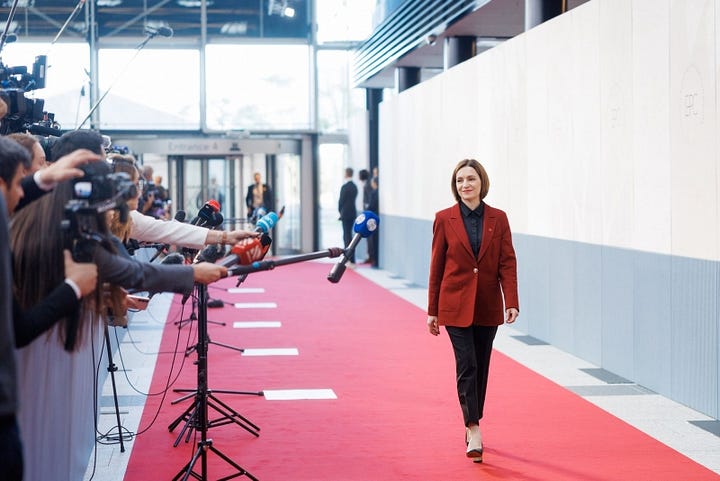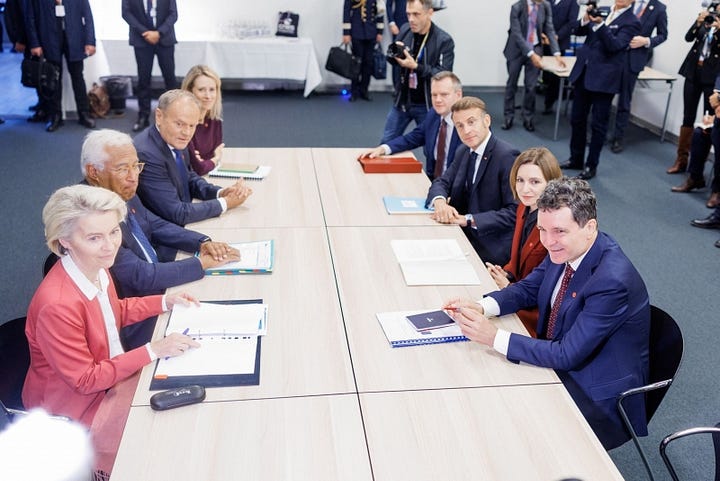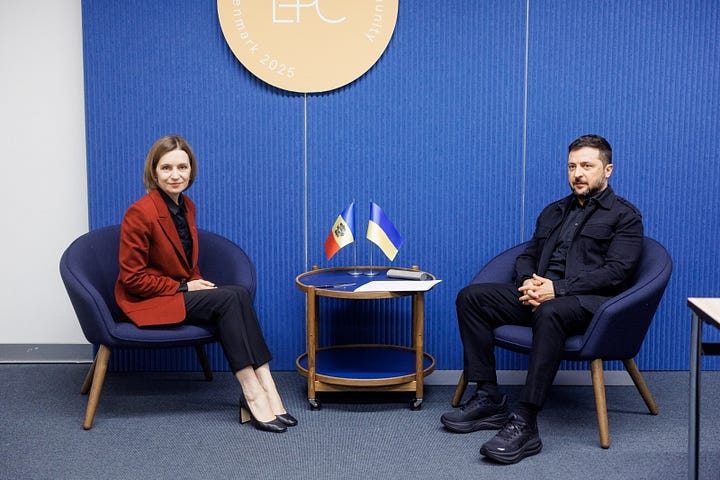Hi everyone - welcome back to Moldova Matters! For those of you living in the country, I hope you enjoyed the National Wine Day festivities! The weather was pretty terrible, but that’s the kinda thing a good glass of Moldovan wine can help with! Today we’re going to catch up on the news of the week and the aftermath of the elections. But first, let’s look at the big picture…
What Comes Next Following the Elections?
According to Moldovan law the Central Election Commission (CEC) is to certify the results of the elections within 5 days of the vote. Following this, they send the certified results to the Constitutional Court (CC) which then has 10 days to validate or annul the election results. The current government continues in a caretaker capacity until the election is validated.
Once validated by the Constitutional Court, parliament must convene in an inaugural session within 30 days. This session is convened by the President and begins the process of officially organizing parliament itself. Within 10 days of this session, parliament must elect a Speaker and Deputy Speakers and other official positions. The new Members of Parliament (MPs) will also officially form “factions.” In practice these are organized along party lines, but there are exceptions - and we already have a few to discuss below.
Once factions are formed, the President must consult with these factions and designate a candidate for Prime Minister. This candidate is put forward by the majority party / faction or coalition and approved by the President. Once proposed, this candidate has 15 days to gather a list of ministers and write a governing program. With this complete, the Prime Ministerial candidate presents the cabinet of ministers and government program to the parliament for approval. MPs vote to support the government (or not) and when approved, the President has 14 days to officially approve.
All of these deadlines, 10 days here, 15 days there are maximums not minimums. It’s very possible that things will happen much faster. With a single party holding a majority in parliament, and thus, no need for coalition negotiations, it will likely be much faster.
The President’s role in this process is mostly ceremonial, but she does have the ability to intervene here if she wants too. This is rare, and in 2021 provoked a constitutional crisis. With an incoming PAS government things will be all smooth sailing, but its worth remembering that in all of these negotiations and 10 / 15 day deadlines there was potential for a lot of shenanigans if the election was less decisive.
Election Updates - Aftermath
Here’s a roundup of the top election related stories of the past week:
On October 5th the CEC certified the election results and sent them to the Constitutional Court. This took slightly longer than 5 days as the CEC considered evidence of potential electoral irregularities regarding the Democracy at Home Party (PPDA). On September 28th, before the results were reported, PAS filed a complaint with the CEC citing a video made by George Simion calling on his followers not to vote for AUR, but to vote for PPDA instead1. They also cited evidence of coordinated TikTok promotion not accounted for in campaign finance reports. The CEC heard witnesses and received reports from the police and security services on the topic. Ultimately, the CEC issued a warning to PPDA and moved to restrict state financing for the party for 1 year - a decision that will be appealed in court. All this evidence is being sent to the Constitutional Court which will decide whether or not to ratify the 6 parliamentary mandates for PPDA. This topic has produced mixed commentary in Moldova, with many people agreeing that the sudden surge and apparent foreign support for PPDA is an issue, but also being extremely wary about removing a party from an election after it has taken place.
PAS got more votes in 2025 than in 2021. The party received 792,557 votes in this election as compared to 774,753 in the last (a 17,000 vote difference). They lost seats in spite of a better showing due to higher turnout overall and the parliamentary math of fewer small parties nearing the threshold but not making it to parliament.
PAS lost 2 MPs and will have 53 in the parliamentary faction not 55. Incoming MPs Dinu Plîngău and Stela Macari announced that they would sit as independents in the new parliament and would not join the PAS faction. Recall, both politicians were members of the Împreună (Together) Bloc before dropping out of their respective parties and joining the PAS list for the election. This was one of PAS’ attempts to consolidate the pro-EU electorate. Both politicians sought to calm fears by saying that they will work “alongside PAS” to support the government. Explaining the move, Dinu Plîngău stated:
“We will work together with our colleagues from PAS both to invest in a government, and we will dedicate ourselves to making the new government more transparent, more qualitative, more inclusive, more resilient.”
“Both I and Mrs. Macari had a civic responsibility to convince people who did not necessarily sympathize with PAS, or perhaps not at all, that we now have to vote for this party to go to Europe. Both I and Mrs. Macari are not part of PAS. We had a civic responsibility to act as we did and now we also have a duty to represent the voices of the silent in Parliament. In both me and Mrs. Macari, the press and civil society will find a partner always open to dialogue and transparency.”
PAS Party Leader Igor Grosu responded to this news saying:
“We regret that we learned about the announcement of the 2 colleagues from the press without discussing it as a team, but we express our confidence that all the deputies who entered Parliament on the PAS list will honor the mandate received from the citizens - namely accelerating the European vector, cleaning up the justice system and ensuring economic development.”
Election observation missions’ conclusions - a well run election with massive external influence. The Civic Coalition for Free and Fair Elections (CALC), which has over 2 decades experience monitoring Moldovan elections, called the process “partially free and partially fair.” They highlighted Russian attacks citing “elements that fit into the patterns of hybrid warfare and that affected the fairness of the process.” They praised the “professionalism” of the CEC and state institutions for their “demonstrated resilience.” The report noted problems with the use of administrative resources by parties, church involvement and problems with the last minute changes to Transnistrian polling stations. The Committee on Open Democracy report echoed many of these same themes and also praised a competitive election that was fairly run in spite of challenges. Both reports also stressed the need to assure equal access at rural voting places for people with disabilities.
Hybrid War and Law Enforcement - Aftermath
President Sandu was asked by a journalist what changed between last year’s referendum / presidential elections and this year’s parliamentary elections. Specifically, the question targeted efforts by the authorities to push back against hybrid attacks and voter bribery. The President responded stating:
“I can tell you what the big difference was between the results of the institutions last year and this year. Last year, unfortunately, in both the first and second rounds, but especially in the first round of the presidential elections and the referendum, many votes were bought. The police acted then too, but they did not have the cooperation of the Prosecutor’s Office. The police can do their job from here to here, but for the process to be completed, all institutions must participate.
This year, the Prosecutor’s Office did its job according to the law and there were results. These schemes stopped. The people who organized, or tried to organize vote-buying schemes, made a lot of people miserable who ended up paying large fines for selling their votes. But those who lured these people into traps must answer, first of all. This year, because all the institutions worked, because it wasn’t the situation of last year - when one institution said it was working and another didn’t want to work, as if it wasn’t everyone’s country. We have now seen that the state can be efficient when institutions respect the law and fulfill their obligations. Nobody asks them for anything else”,
In these statements, President Sandu was referring to the Anti-Corruption Prosecutor’s Office, and particularly former Anti-Corruption Prosecutor Veronica Dragalin. Recall, in late 2024 the President stated that “we saw a total failure on its [The Anti-Corruption Prosecutor’s Office] part in the fight against corruption and especially political corruption.” She used this reasoning to begin the process of reorganizing the office that ultimately forced Dragalin out in early 2025.
Other Shor and Hybrid War News
Here’s a roundup of the other top stories of the week:
ZdG and Anticoruptie.md separately infiltrated the “operation diaspora” coordinated “election observer” network. They reported on how a coordinated central organization (unnamed) recruited observers in the diaspora in the name of parties / candidates CUB, AUR, NOI and Andrei Năstase. Some became officially accredited with the CEC as observers, and some were not accredited and placed outside the polling stations with body cameras and tools to count voters. One man messaged an undercover journalist demonstrating that he had been paid €1500 euros for representing Andrei Năstase - something that Năstase denies. The focus of the network seemed to be on counting voters, seeking to film irregularities and to capture photos of the hand written tally sheets from each polling station on the night of the vote. Details continue to emerge and we’ll keep an eye on this and what it may have been about2.
“Journalist” and Russian propagandist Gabriel Călin was arrested on September 30th for facilitating money laundering and illicit party financing. Police allege that Călin, who ran on the party list of the Christian-Social Union of Moldova (UCSM) party, moved $150,000 in money from Russian sources into Moldova between 2021 and 2025. They presented recordings where he allegedly was paid €5000 euros for a single short election video calling on voters who had supported parties that were removed from the elections to vote for him. Post arrest scrutiny from journalists found that Călin reported earning less than 2000 lei / month in 2024 while purchasing multiple brand new motorcycles. Other members of his party had similar “no income” situations paired with luxury purchases.
Marina Tauber was sentenced to 7.5 years in prison for illegal financing of the now defunct Shor Party. She was also barred from holding public office for an additional 5 years. Tauber left the country, with the court’s permission, in January and is now considered a fugitive.
Transnistria is rationing natural gas. The regional “authorities” announced a 1.5 week rationing plan due to “unfavorable circumstances related to the need to restore financial aid from Russia.” They claim that the supply will be restored then. Author’s Note: Going into winter the energy situation in Transnistria is a place I will be watching closely.
European Political Community Summit
President Sandu attended the EPC Summit on October 2nd with the wind at her back. She stated:
“We came to the summit of the European Political Community with a strong mandate from the citizens to advance the accession of the Republic of Moldova to the European Union,”
… and later emphasized Europe’s support for Moldova’s electoral process saying:
“Our partners appreciate the firmness with which Moldovans defended democracy and resisted attempts at interference. We will continue to work together for Moldova to become part of the European Union, ensuring the country’s development, peace and security,”




The Moldovan President conducted many meetings on the sidelines of the conference and spoke on a panel with British Prime Minister Keir Starmer, French President Emmanuel Macron and Polish Prime Minister Donald Tusk. There she spoke about Moldova’s lessons learned in pushing back on Russian hybrid attacks and preserving the nation’s democracy.
Plahotniuc Updates
This week a court ruled that Plahotniuc will be separated from the larger “Theft of the Billion” banker’s case and tried alone. Prosecutors requested the separation citing the fact that Plahotniuc is in jail right now and a separate trial will be speedier. His lawyer disagreed3 and was furious at the outcome.
Also, after multiple weeks of speculation, Plaha lackey and bodyguard Constantin Țuțu (pronounced Tsutsu) has been located. He was arrested for trying to illegally cross the Moldovan-Ukrainian border at Vulcăneşti-Vinogradovca in Gagauzia.
You may recall that there was a lot of confusion as to where Țuțu has been. He was arrested in Athens alongside Plaha in July but was later released by Greek authorities in mid September. Țuțu has multiple ongoing court cases in Moldova, but was not technically on the international wanted list. Prosecutors then argued that he should be on the wanted list and a Moldovan court issued an arrest warrant. Where he was at this time was already a mystery.
First, prosecutors alleged that he had arrived in Transnistria (somehow), but this wasn’t confirmed, and was partially contradicted, by Prime Minister Recean. Then his lawyers stated that he had left Athens on a flight to Chisinau - but he never arrived. Then his lawyers said that he had bought the ticket - showing that he fully intended to go back - but had gotten held up for unspecified reasons.
Now prosecutors are alleging that all this confusion was partially intentional. Țuțu was in Transnistria when he found that he was wanted and (allegedly) being investigated for illegally entering the region (Moldovan territory) from Ukraine. He then (allegedly) left Transnistria and re-entered Ukraine illegally with fake documents with the intention of crossing back into Moldova legally. According to police he:
“intending to legalize his presence on the territory of our country, in the hope of misleading the criminal investigation body”
This led him to the Vulcăneşti-Vinogradovca border crossing where he attempted to bribe a border guard with €700 euros. Apparently the Plaha acolyte did not realize how much has changed in 6 years and he was arrested. Now he faces charges of illegal border crossing and active corruption (bribery). Appearing in court he denied these accusation saying “I entered the country legally.”
A violation not only because it’s campaigning on election day (not allowed) but also because Simion himself is banned from entering Moldova on national security grounds. The campaign alleges that PPDA is a camouflaged political movement actually under Simion’s control.
Speculating, I think they were likely actually observing. This central coordination group was likely linked to Shor / GRU and intended to find (and ideally film) some smoking gun that could be used in a “stop the steal” campaign. Russian propaganda has repeatedly said that PAS would rig the elections via ballot stuffing in the diaspora. Possibly they thought this would actually happen, or that they would get evidence to make it seem like it had. Most of these observers who were questioned / confronted admitted that things seemed to be running smoothly without issues.
Technically, he agreed that it would be a faster trial but disagreed that this is a good thing.

